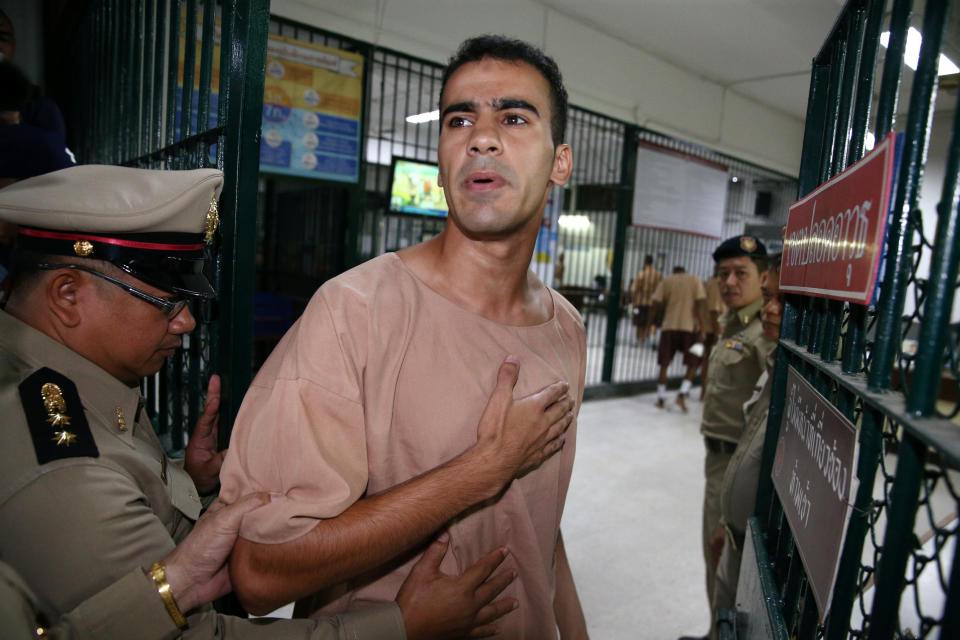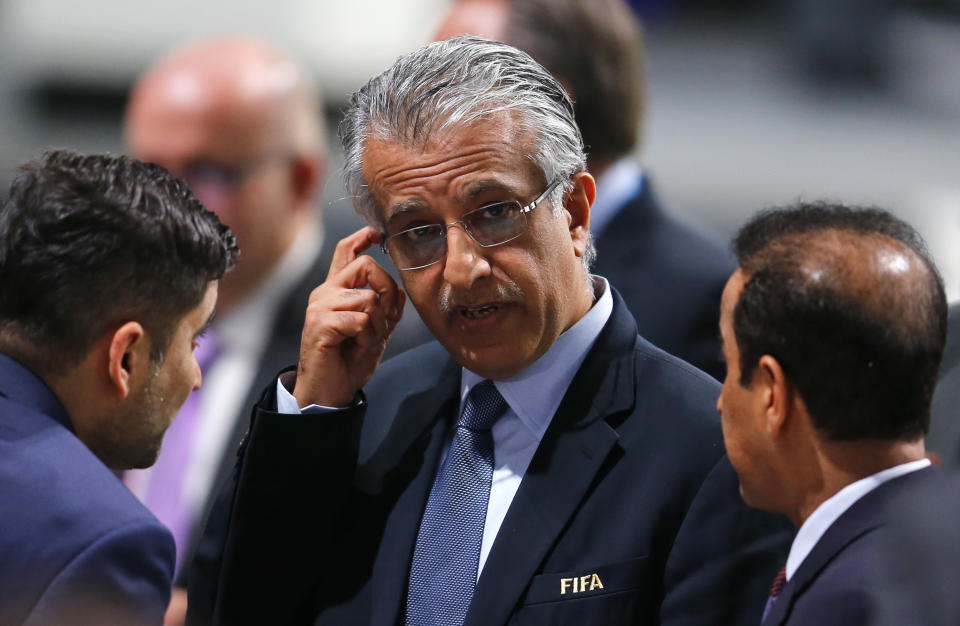How #SaveHakeem movement could help much more than a Bahraini-Australian refugee and soccer itself

A bright light does not flatter the business of soccer. The closer your seat is to the inner workings of the sport, the more odious your view of it is likely to be. You name it, and someone prominent in soccer has been credibly excused of it: corruption, graft, money laundering, human trafficking, bribery, intimidation, torture, and so on.
Certainly, the ongoing ordeal of Hakeem al-Araibi ranks up there.
On Monday, the shackled Bahraini-born refugee, who lives and plays in Australia as a semi-professional defender for the second-tier Pascoe Vale FC, was marched into a Thai court barefoot, heavily guarded. There, a judge denied him bail but agreed to let him make his case against extradition back to Bahrain.
Arraignment was scheduled for April 22, when a trial date will be set. He’s been held captive in Thailand since Nov. 27, when al-Araibi and his new wife landed there for their honeymoon. His arrival triggered an Interpol red notice, because Bahrain had demanded his extradition.
In Bahrain, al-Araibi, once a member of the youth national team there, stood accused of vandalizing a police station in 2012. But there’s TV footage of him playing in a soccer game at either the exact same time or so close to it that he couldn’t possibly have committed the crime. Still, he was found guilty in absentia and sentenced to 10 years in prison. Amnesty International called that trial unfair.
Besides, al-Araibi tells a different story. When he spoke out against the well-documented torture of prominent Bahraini athletes in 2011 after the unsuccessful uprising against the regime there, as part of the wider Arab Spring, he was himself arrested and tortured.
[ Follow Yahoo Soccer on Twitter and Facebook ]
When al-Araibi learned of his sentencing in 2014, he fled to Australia, where he became a citizen in 2017. But what might have really provoked Bahrain’s ire are his comments in 2016, when al-Araibi blamed Sheikh Salman bin Ebrahim al-Khalifa, president of Asian soccer’s governing body and a member of the ruling family, for discriminating against Shia Muslims and implicating him in the torture of the athletes. Sheikh Salman was once within a few votes of becoming FIFA president.
“This is nothing to do with my conviction; Bahrain wants me back to punish me because I talked to the media in 2016 about the terrible human rights and about how Sheikh Salman is a very bad man who discriminates against Shia Muslims,” al-Araibi, a Shiite, told the Guardian a few weeks ago. “I am so scared of being sent back to Bahrain, so scared because 100 percent they will arrest me, they will torture me again, possibly they will kill me.”
Nevertheless, Thailand set in motion his extradition after arresting him. Interpol has rescinded the notice, saying it was made in error. Yet Thailand continues to pursue the extradition, essentially accepting Bahrain’s contested claim.
“Please don’t send me to Bahrain,” al-Araibi shouted to the assembled press on Monday.
Must-watch report by @BBCNews SE Asia Correspondent @pakhead as Bahraini refugee footballer Hakeem al-Araibi faces a further 60 days in Thai jail after appearing shackled and barefoot for extradition hearing pic.twitter.com/vUUs1HNOvm
— Dan Roan (@danroan) February 4, 2019
Thailand is known for unscrupulously sending refugees back to their home countries whatever the peril. Just last month, Rahaf Mohammed, a Saudi teenager who feared she’d be honor-killed by her family if she returned, wasn’t saved from such a fate until an international outcry forced Thailand’s hand. For now, Thailand argues that, since al-Araibi’s case is a criminal one, rather than a pure refugee claim, the cases aren’t equivalent.
But the same kind of swell of public opinion Rahaf got is now gathering for al-Araibi. The #SaveHakeem hashtag has trended on social media and been repeated by major soccer figures. The day of his court appearance, rallies calling for his release were held in several cities across Australia, as well as in London, Berlin and Toronto.
Representatives from 14 countries and the European Union showed up to the courthouse to demonstrate their support, including FIFA’s head of sustainability and diversity. He said that FIFA tried to pull strings through Thailand’s soccer association, but that the global governing body simply has no jurisdiction over legal matters in its member nations. (Which, yes, and thank God.)
Fatma Samoura, FIFA’s secretary general, visited al-Araibi in jail and has tried to make entreaties. So has Australia’s prime minister.

Then again, FIFA president Gianni Infantino had no apparent qualms about handing winners’ medals to Qatar, the Asian Cup victors, alongside Sheikh Salman on Friday in Abu Dhabi.
One of the most vocal advocates for al-Araibi is the former captain of Australia’s national team, Craig Foster, who called on Thailand and Bahrain to be suspended from both soccer and the Olympics until justice is done.
For a sport that’s been thin on moral fiber and has, for decades, lacked the cohesion to really unite on anything, the support rallied behind a Bahraini-Australian semi-professional player has been a remarkable spectacle.
Soccer seems to be discovering its own power in social activism in real time in the al-Araibi case, as pressure on Thailand mounts to release him, just as it did for Rahaf. If it succeeds, this newfound muscle could be flexed for broader causes, finally forging a conscience for a fragmented sport.
If activism finally comes to soccer in a real way, it could at last wield the sport’s enormous influence as a force for good.
Leander Schaerlaeckens is a Yahoo Sports soccer columnist and a sports communication lecturer at Marist College. Follow him on Twitter @LeanderAlphabet.
More from Yahoo Sports:
• Schwab: The nightmare game that ‘kills’ Rams’ Goff
• A giant mess on TV as CBS tries to interview Brady
• Another Super Bowl, another Pats locker-room crasher
• Rams coach after loss: ‘Definitely, I got outcoached’


